Juicer Pulp Recipes
Last updated on
It is not about what recipes you can make out of the juicer pulp. It is a question of whether to use, or NOT to use the pulp.
For Food | For Animals | Back to Nature | Others
Should you use the pulp from juicing?
Many fellow juicers thinks that it is a waste to throw away the pulp after juicing, and want recipes for using the pulp.
I personally do not reuse the pulp for a few reasons. But before I go into the reasons, let me explain that I only use a gear juicer at home.
By using a gear juicer, I don’t normally buy organic fruits/vegetables as the juicer is able to separate the chemicals/pesticides from the juice. Therefore, the pulp would have chemicals and pesticides. A centrifugal juicer cannot do this.
My reasons for not reusing the pulp:
- The pulp would have somewhat oxidized and be nutrient-depleted after juicing, so does not contribute any good to health.
- The pulp from my juicer is squeezed very dry and is no longer moist; nor has it any more taste or flavor.
- Since vitamins and enzymes are destroyed with heat, I don’t see any good deriving from the pulp which has been baked, fried, steamed or cooked in whatever cooking methods. I’ve already gotten the best of the nutrients in my juices.
- In my family, we generally don’t eat foods made of flour and sugar, like cakes, breads or biscuits, therefore, I don’t fancy reusing the pulp to make them into these items.
I’d rather “waste” as some people may call it waste, than putting them into my body. But this is only my own preference. You decide whether you want to reuse the pulp.
Deliberately grating the fruits/vegetable for its pulp as an ingredient is entirely a different thing.

However, I do reuse the pulp as compost for my plants. I bury the pulp into the soil around the plants as fertilizers. Plants have the amazing ability to reconstruct the minerals from the pulp into organic materials that are suitable for our bodies.
If you want to do this, make sure that you bury the pulp instead of laying them on top of the soil. This is so that it will decompose nicely into the soil, and also to prevent it become mouldy or attracting ants.
Another thing you could do with the pulp, if you have dogs at home (or other pets), is to mix the pulp with dog food. This is low-calorie, filling, and would provide some fiber for your dog. But, be sure you are using organic produce.
What about the fiber?
Now we have to get back to basics. Why do we juice in the first place? To get quick assimilation of the nutrients and minerals to our cells for healing purpose.
While I agree that fiber is so important in our daily diet, this site is foremost, about juicing for health. Juicing will be part of our healthy diet and we will need to consume our fiber from eating more fresh fruits and raw vegetables, and other fibrous foods like grains and beans.
Learn to make delicious salads to supplement your healthy dietary with sufficient fiber. Read more about fiber here.
Pulp Recipes
For the sake of those who would still like to make something out of the pulp, this page provides you some ideas of what you can do with your juicer pulp. These are contributions from fellow juicers. How about sharing what YOU do with YOUR juicer pulp? Spread your joy 😉
Some of the links I post on this site are affiliate links. If you go through them to make a purchase, I will earn a small commission (at no additional cost to you). However, note that I’m recommending these products because of their quality and that I have good experience using them, not because of the commission to be made.
Comments
Leave a Reply




























 JOIN OVER
JOIN OVER
I am confused. How can a gear juicer separate the pesticides and chemicals from the juice. Regardless of the type of juicer you use, the only way to remove the pesticides would be through some type of distillation or by adding chemicals that would react with only the pesticides. Distillation would kill the good nutrients and finding chemicals which would pull out the pesticides would cost a fortune to develop.
Hi Kevin, perhaps this article may explain to you better, about how a gear juicer may MINIMIZE the pesticides and chemicals inclusion in your juice: http://juicing-for-health.com/minimize-chemicals.html
I use my pulp for making dehydrated (low temp so as to remain raw) crackers. Sometimes, I will toss carrot pulp in in my raw veggies soups (blended salad, basically).